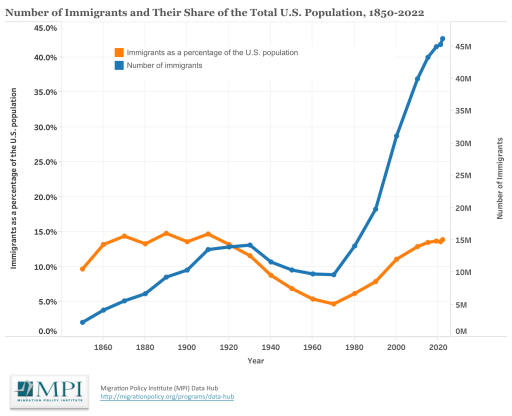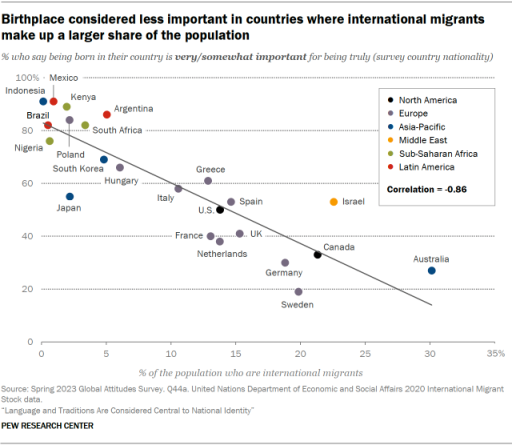From its very beginning, the United States population has been shaped by immigration. The chart below gives a glimpse of what that has meant over the centuries.

The chart, from the Migration Policy Institute, has a blue line (using the right vertical axis) tracking the number in millions of immigrants to the country from 1860 to the present. In this nomenclature, “the term “immigrants” (also known as the foreign born) refers to people residing in the United States who were not U.S. citizens at birth. This population includes naturalized citizens, lawful permanent residents (LPRs), certain legal nonimmigrants (e.g., persons on student or work visas), those admitted under refugee or asylee status, and persons illegally residing in the United States.”
The numbers increase from about 2 million to about 15 million in 1930. Then there is a fifty year decline until 1970, during which the numbers of foreign born residents decline to about 10 million. Starting in 1970 there is a large increase in number all the way to the present, now above 45 million.
The orange line (using the left y-axis) represents the percentage of the total US population that are immigrants. Here the percentages hover around 15% for decades in the 19th century, dip in the middle of the 20th century and rise again to about 15% at the present time. Thus, for many decades of its existence, around 15% of the US population has been foreign born, but recent decades have experienced a return to that level from lower percentages.
Immigration from the South to the North is a global phenomenon at this time. It is a source of some tension in receiving countries, with many policy issues rising to the forefront in political debates. One interesting question related to this movement is what attributes populations consider when thinking of their national identity. How important to a society is being born in the country to considering someone a national of that country?
In that regard, a new Pew Research Center release is relevant. It reports on a multi-country survey conducted in 2023, including Canada, France, Germany, Greece, Italy, Japan, the Netherlands, South Korea, Spain, Sweden, the United Kingdom, Hungary, Poland, Indonesia, Israel, Kenya, Nigeria, South Africa, Argentina, Brazil, Mexico, Australia, and the United States. There were some differences in data collection times and modes of data collection, but there is a set of questions about attitudes toward immigrants common to all the surveys.
Some of the more interesting findings surround attitudinal items about what attributes are required for deeming that someone really belongs to the resident country. More respondents across the 21 countries report that be able to speak the country’s common language is important (median across the countries, 91%). Next in the list is sharing the country’s customs and traditions (median across countries, 81%).
Relevant to the observations above regarding US immigration, the third largest percentage is “having been born in the country.” About 60% of the respondents over the various countries cite that as important in their country’s national identity. The United States is on the low end of the 23 countries for percentages of respondents who report this (50%).
There are other countries on the low end of respondents who assert being born in the country is important for national identity. They include Sweden, Germany, the Netherlands, and Australia. Other countries’ respondents overwhelmingly assert that birth in the country is important for a just claim of national identity. They include Indonesia, Kenya, and Brazil.
An interesting analysis across the 23 countries asks whether there is a relationship between flexibility on national identity and the percentage of a nation’s population that is not native born. The chart plots the percentage of respondents who say that being born in their country is “very” or “somewhat” important for being truly considered a national of that country.

Those countries with smaller percentages of foreign born residents have much higher percentages of respondents saying birthplace is important to national identity. In this regard, the United States respondents express attitudes expected of those countries that have around 15% of their populations born outside the country.
A few countries seem to be outliers. Respondents in Japan, with only a very small proportion of immigrants, tend to ascribe relatively low importance to birth place for national identity relative to other countries with similar proportions foreign-born. Israel, with high percentages of immigrants, places a higher than expected importance to birthplace for national identity.
These surveys a merely a point-in-time portrait of the countries’ residents. There are well-documented tensions when there are surges of immigration. (However, in examining the European countries now experiencing large in-migration, there is no evidence that birthplace is judged unusually important to their national identity.)
Overall, the analysis suggests, perhaps, good news. For countries having higher percentages of immigrants, national identify is viewed as less rooted in where one is born.
But these data do not inform the causality underlying the linkage between the two attributes in the chart above. For example, not answered by these data is when, as immigrants increase their presence, does national identity become less-rooted in birthplace. Alternatively, it is not clear whether more open cultures support larger flows of immigrants in the first place; that openness precedes the flow of immigrants. In any case, that there is larger support for foreign-born residents to be considered full nationals among those countries with more foreign-born residents is a correspondence that seems healthy for a sustainable society.

Interesting.
Very interesting and informative analysis!!!
Thank you!
Very interesting and informative analysis!!!
Thank you!